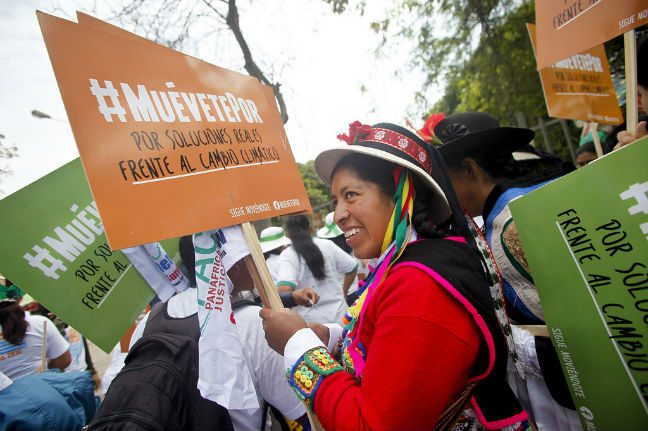By Susana Arroyo Barrantes, Oxfam Peru
With just two days to go at the UN Climate Conference in Lima and in the biggest march in Peru in the last 20 years — thousands of people took to the streets yesterday to demand action against climate change.
In September, thousands were also on the streets in New York. This global movement is demanding alternatives to combat climate change and the message is being heard. The message is for world leaders is it’s time to act — before more lives are lost to floods and droughts, before even more people go hungry and before it’s too late.
Why do we march?
We do it to protect the food we eat and the people who produce it, to protect the forests and to honour the memory of those who have lost their lives trying to protect these things. We march to demand serious laws that reduce the impact of climate change on rural women and avoid millions of people going hungry.
We march because, ultimately, climate change is not just about the climate: it’s about life itself.
We have also organised ourselves because we have power and we want to use it. This is the people power capable of combating injustice and changing the world, a power that emerges when we act together. When we march, when we join others in the fight against global warming, and when we, from our place in the world – wherever that may be – propose and demand policies to achieve development and growth that does not destroy the planet along with our rights, we can achieve amazing things.
From a seed grows a forest
This is the slogan we marched under yesterday and it’s a perfect metaphor. If power were a plant, then yesterday’s march was a fine day for cultivation. Thousands of us marched, thousands of seeds were sown, and from these seeds will grow a leafy forest, one that’s diverse, rich and full of life. A forest that can never be cut down.
World leaders, we said it yesterday and we’ll continue to say it today, tomorrow and the days after that – it’s time to act.
Share the #lessonsfromvanuatu
Vanuatu’s #climatechange response shows value of investing in adaptation & community resilience #lessonsfromvanuatu | TWEET |
Increased frequency & intensity of extreme rainfall in Vanuatu to seriously impact infrastructure & agriculture #climate #lessonsfromvanuatu | TWEET |
#Climate projections for Vanuatu show decrease in frequency of cyclones but increased proportion of more intense storms #lessonsfromvanuatu | TWEET |
World Risk Report lists Vanuatu as most at-risk country, based on exposure & vulnerability to #climate hazards #lessonsfromvanuatu | TWEET |



